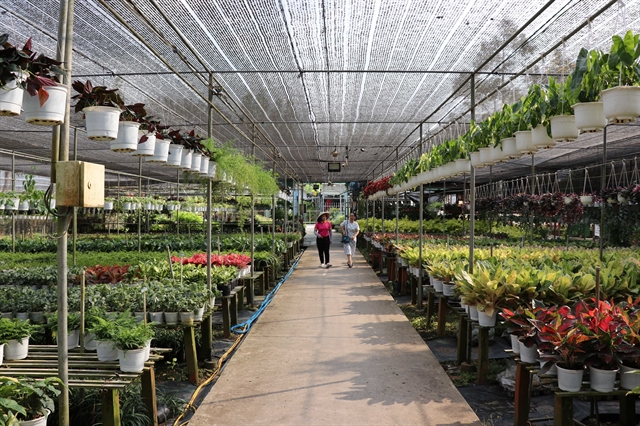Đồng Tháp Province sets sights on agricultural, rural tourism
Society – Economy - Ngày đăng : 11:24, 05/11/2024
 |
| Hai Hơn lotus field tourism site in Đồng Tháp Province’s Tháp Mười District. — VNA/VNS Photo Nguyễn Văn Trí |
ĐỒNG THÁP — Đồng Tháp Province has enhanced its focus on developing agricultural and rural tourism to capitalise on its strengths and improve incomes.
Lê Quang Biểu, deputy director of the provincial Department of Culture, Sports, and Tourism, said there is significant potential for agricultural tourism development due to its well-known speciality products like flowers, fruits, and seafood.
Through Đồng Tháp's agricultural tourism tours, visitors can sample the region's speciality foods, such as grilled snakehead fish wrapped in young lotus leaves and dipped in tamarind fish sauce and the popular sweet and sour soup made with young linh fish and điên điển flowers, both seasonal products of the delta’s flooding period.
Visitors can also enjoy over 200 dishes made from lotus, a local delicacy.
The largest lotus-growing province in the Cửu Long (Mekong) Delta is home to many lotus fields that have been adapted to serve as tourist attractions.
It now has 72 sites offering agricultural and community-based tourism services, up from only two in 2015, when a five-year tourism development plan was initiated.
They are primarily located in Sa Đéc City and the districts of Lai Vung, Tháp Mười and Tam Nông.
Sa Đéc has 18 of the sites, one of which is recognised as a four-star product under the national “One Commune – One Product” (OCOP) programme, while six others have achieved three-star recognition.
Visitors to Sa Đéc, renowned for its flower and ornamental plant cultivation, can explore hundreds of varieties of flowers and ornamental plants and learn about their characteristics, origins and cultural and economic significance.
The city receives around one million tourists annually, including over 40,000 international visitors.
The Ngọc Lan Ornamental Plant Farm in Sa Đéc City, recognised as a three-star OCOP tourism product, attracts around 1,000 visitors monthly.
They can try their hand at growing flowers and ornamental plants, take photographs, buy plants, and enjoy panoramic views from the farm’s 18-metre observation tower.
Owner Trần Hữu Tài said: “Since receiving OCOP product recognition, the farm has become more popular, drawing tourists and helping boost the city's tourism profile.”
In Lai Vung District, 16 agricultural tourism sites primarily feature pink mandarin orchards that attract hundreds of thousands of tourists each year, especially during Tết (Lunar New Year) when the fruit ripens.
At a lotus field tourism site managed by 12 households in Tháp Mười District, visitors can go boating, admire the flowers, fish, and savour a variety of lotus-based dishes.
The province has introduced agricultural tourism services that allow visitors to experience a day as a farmer or take part in traditional fishing activities during the Đồng Tháp Mười (Plain of Reeds) flood season.
There are also other new tourism products such as the Định Yên community-based tourism village in Lấp Vò District and Tân Thuận, its counterpart in Cao Lãnh City, Long Khánh scarf weaving village in Hồng Ngự District, and rural markets in Tân Thuận Đông and Gò Tháp.
Combining tourism with agriculture has added value to local products, created jobs for rural residents and provided farmers with a steady income, according to the Department of Culture, Sports, and Tourism.
Đồng Tháp received more than four million tourists to rank fourth among the 12 provinces and Cần Thơ City in the Mekong Delta last year.
Tourism revenues topped VNĐ1.9 trillion (US$75 million).
 |
| A net house for growing flowers and ornamental plants serves tourism at the Happy Land Hùng Thy Tourism Area in Đồng Tháp Province’s Sa Đéc City. The tourism area has been recognised as a four-star product under the country’s “One Commune – One Product’ (OCOP) programme. — VNA/VNS Photo Minh Hưng |
Support initiatives
Đồng Tháp has implemented several policies to support tourism development like financial assistance and soft loans for community-based tourism initiatives.
It has allocated VNĐ17 billion ($672,000) to help 47 tourism establishments grow their businesses.
Trương Văn Mai, owner of the Nam Hương Ecological Farm in Sa Rài Town, Tân Hồng District, said: “The province’s policies encouraging tourism development align well with current trends, as most visitors to my farm seek to connect with nature.
“To encourage them to stay longer, we have invested in facilities to meet their needs for dining, relaxation and entertainment. Organic and environmentally friendly farming methods are also essential, as they are key reasons visitors come to my farm.”
The province has prioritised infrastructure development to support tourism, particularly transport projects that link tourist destinations.
These efforts have enhanced the appearance of rural areas, bolstered local economies, preserved cultural and historical sites, and protected the environment.
Huỳnh Thị Hoài Thu, the department’s director, said Đồng Tháp would continue to market its tourism assets and actively seek investment in the sector.
“The province will create favourable conditions for travel companies and tourism destinations to showcase their services at tourism fairs, events and cultural festivals both in and outside the province.
“We will also integrate with the delta’s tourism product network.”
The province hopes to get 4.2 million tourists, including 50,000 foreigners, and achieve tourism revenues of VNĐ1.9 trillion ($75 million) this year.
By 2025 Đồng Tháp's tourism sector is expected to contribute 5-6 per cent of the province's gross regional domestic product.
In the first half of this year, more than 2.5 million tourists visited Đồng Tháp, generating VNĐ1.2 trillion ($48 million) in revenues. — VNS
